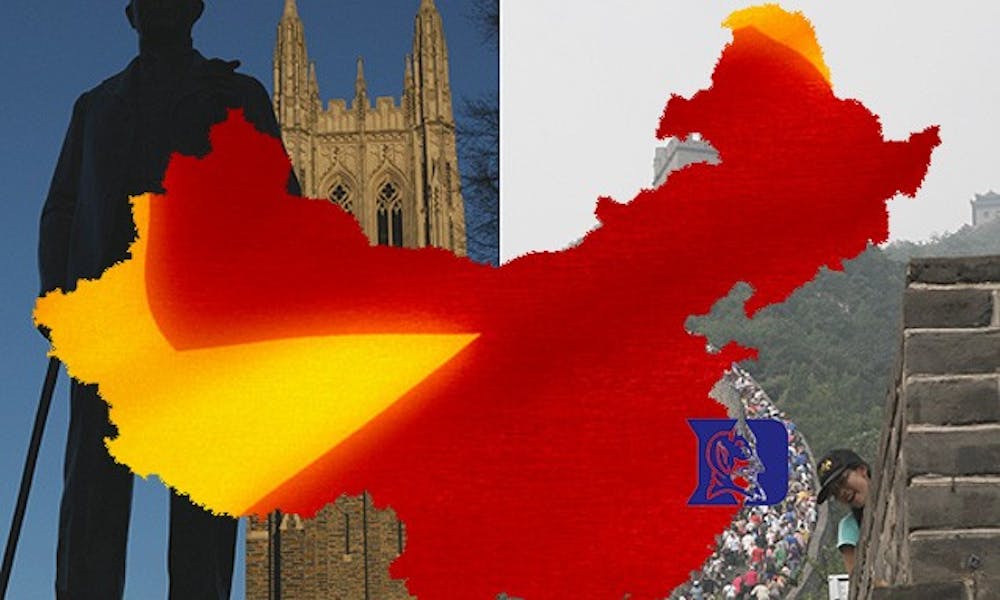The recently announced construction delay at Duke Kunshan University could provide a welcome grace period for those planning the new campus—but comes with additional financial costs.
At the Sept. 15 Academic Council meeting, Provost Peter Lange announced the opening of DKU will be delayed, due to poor weather conditions at the construction site. It is now slated to open for students Spring 2013 instead of Fall 2012. But some administrators and faculty members have said this extension comes as a relief for those working on DKU construction and academic programs.
Executive Vice President Tallman Trask said five of DKU’s six buildings are on track for completion, but construction workers have not yet broken ground on the sixth building—sometimes referred to as the “incubator building” because it will house research facilities and labs. Trask cited construction, academic and financial obstacles as causes for the delay.
“I am quite confident about the five buildings, but I’m not willing to even guess on the [completion date for the] incubator yet,” Trask said, adding that Spring 2013 is a reasonable estimate for the five buildings already under construction.
Trask said he suspects that the city of Kunshan, which is fronting the costs of the campus’ construction, is nearing its budget limit, though it has yet to officially approach Duke about this problem. Although Trask was unable to predict what would happen if Kunshan reaches its budgetary limit, he said it would be the city’s prerogative to halt construction in such a case because the city is footing the bill.
Trask added that unresolved details regarding which academic programs will be utilizing the incubator space are preventing construction on that building from moving forward. He said, for example, the Duke Global Health Institute might require lab space, and the building’s structure and layout could depend on the amount or type of necessary space.
“The incubator is going to be largely programmatically driven,” Trask said. “I don’t want to build an entire building... just for two labs.”
The DGHI faculty plans to vote on potential programs this month, and the Fuqua School of Business, which is expected to provide the first DKU degree, a Master’s of Management Studies in Finance, will also discuss its academic programs this month.
In addition to a Master of Science in Global Health and various undergraduate courses, the DGHI expects to open up a global health research center, said DGHI Director Michael Merson, who also serves as the interim vice president and vice provost for the Office of Global Strategy and Programs. This center could act as a hub for various research initiatives around China. Merson said these academic and research programs will depend largely on lab space at other Chinese universities—the DKU campus, specifically the incubator building, will act as a research base and a “dry lab” that does not require extensive lab equipment.
“A laboratory setup would be at the institutions and the universities with which we are collaborating,” Merson said. “Most of our research on the campus at DKU would be non-lab research.”
The extended construction is giving faculty members extra time to assess and develop these academic programs, said Academic Council Chair Susan Lozier, professor of physical oceanography.
“Faculty believe programmatic development has lagged behind some, so some would feel a little relieved because we have more room to be deliberate about the programs that go there,” Lozier said.
She added that many faculty members’ concerns revolve around which academic programs will be offered, who will teach in China and how academic freedom will be addressed. These issues will be easier to resolve with the extended timeline.
Trask added that the delayed opening will require additional construction oversight. Last year, the University approved $5.5 million to be spent on oversight measures, but Trask said the project will now require additional funds, though he did not know the specific amount. He said extensive oversight has been necessary throughout the project because China has different construction standards than the United States, and choices are often made based on cost-effectiveness rather than reliability.
“[China] just builds buildings very differently,” Trask said. “There are different views of construction, all of which we have to understand because it’s their building in China, not our building in Durham. It is a public works project in China—it’s not being built the way Duke would be built.”
Get The Chronicle straight to your inbox
Signup for our weekly newsletter. Cancel at any time.

